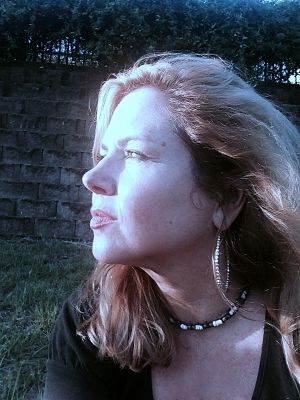Venezuela
in the 1960s
The name itself is a kingdom
brambled over in exotics,
where fish & birds read like orchids,
and an oil-flat sea’s gone dull
beside a land possessed of its own
drumbeat—fist to heart, a howled
& primal green. After all, Amazon
sounds more tribal than rivered.
Venezuela, its new language
an assignation of pleasantries,
and even color. Gracias. Azul.
It was all I could do as a child to count
in newly named values. Oleander,
my mother said, meaning danger.
It’s the gravity, she’d say, handing
me a comb. Venezuela on a map
was a cluster of grapes inside
a larger cluster of grapes—
that southern continent, feral & hemispheric.
Nat King Cole crooned from a needle
threading my father’s album on the turntable.
A circle un-brailling inward
until it bumped a shoreline of static.
Whole notes opening in concentricity.
Magnética. That was Venezuela.
The rain fell in seasons that cleaved glass
puddles from streets. Black flies
leaving ripples and chewing our calves.
What was the equator anyway,
but a line as thin as water skin
between ourselves looking in
and a mirrored sky; the same template
of tree and cloud, the same rainbow
hoisted like a banner from a distant
fiesta. Only here, in Venezuela,
the iguanas dragoned casually under
the coconut palms, and the thick rot
of frogs plastered the gullies.
Sun, a filigree loose across terrazzo.
Look up. You could bless yourself
on the Southern Cross between the monkey
bars. Whirlwinds reversing directions.
Epicentro. Every ceiling revolving
in fan blades—the slow tick
of shadow and stir. Always.
Even while you slept. Be careful,
said the mothers to the fathers,
home for siestas and lifting us children,
combed and giddy, into the current.
Roll your tongue when you say
tierra; yes, it means earth, niños,
but look how beautiful the swirl
of both hemispheres of stars.

 Laura Sobbott Ross teaches English to ESOL students at Lake Technical College in central Florida, and has worked as a writing coach for Lake County Schools. Her writing appears in Blackbird, Meridian, The Florida Review, Calyx, Natural Bridge, and many others. She was named as a finalist for the Art & Letters Poetry Prize 2016, and has been nominated four times for a Pushcart Prize. Her poetry chapbooks are A Tiny Hunger, from YellowJacket Press, and My Mississippi, from Anchor & Plume Press.
Laura Sobbott Ross teaches English to ESOL students at Lake Technical College in central Florida, and has worked as a writing coach for Lake County Schools. Her writing appears in Blackbird, Meridian, The Florida Review, Calyx, Natural Bridge, and many others. She was named as a finalist for the Art & Letters Poetry Prize 2016, and has been nominated four times for a Pushcart Prize. Her poetry chapbooks are A Tiny Hunger, from YellowJacket Press, and My Mississippi, from Anchor & Plume Press.


